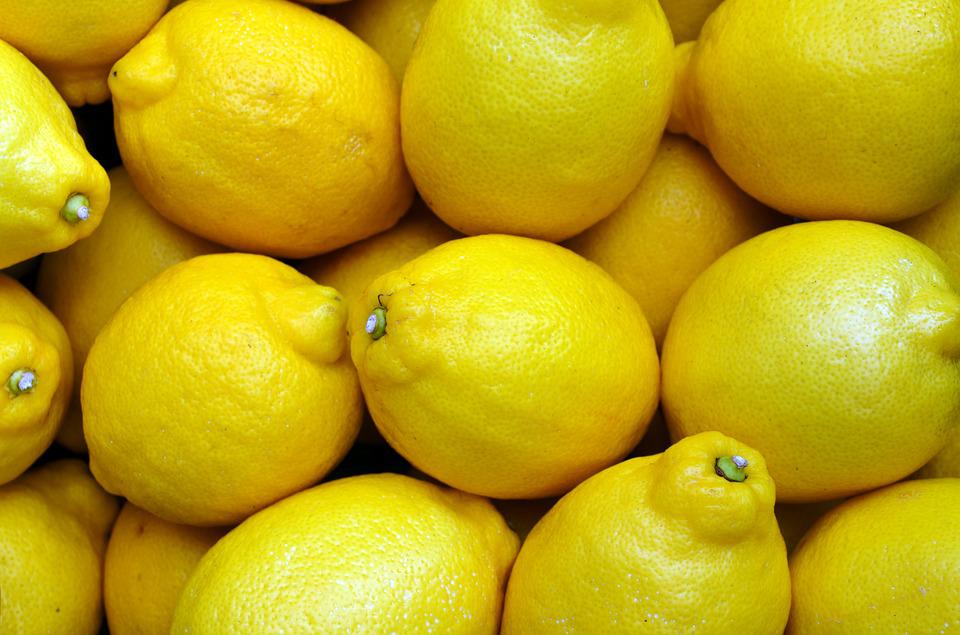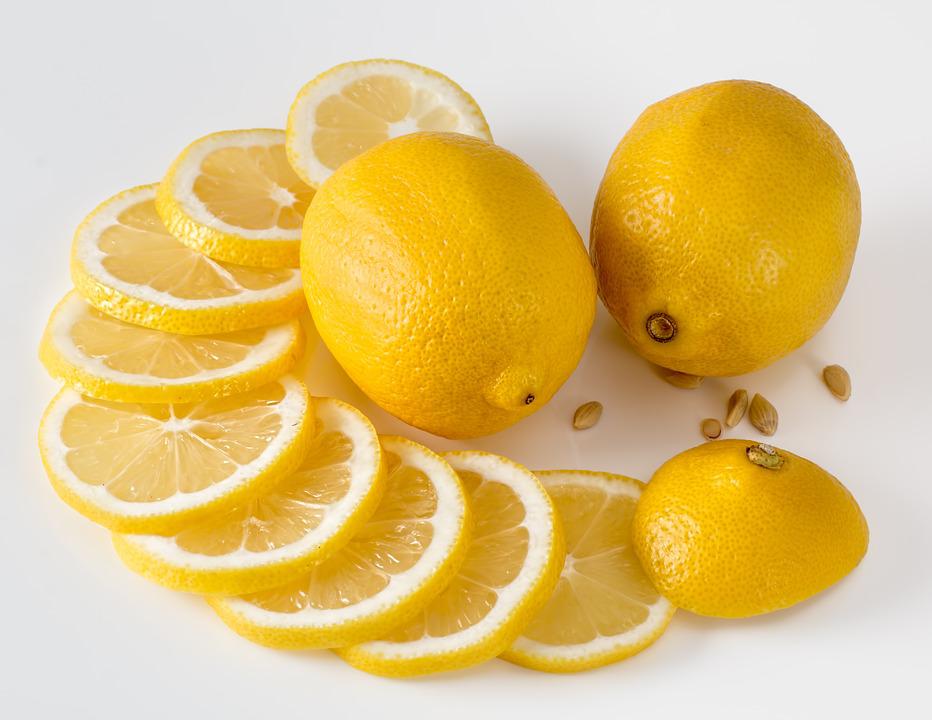Lemons are famous across the world for their signature sour/tangy flavor that can add value to your food, skin, health and overall LIFE (you will also be convinced by the end of this post). This oval-shaped, yellow citrus fruit can be seen on evergreen trees that can either be cultivated commercially or in your home garden. Moreover, lemons grow well in warm, mild climates, like India, California and Mexico. They are used widely in food items and beverages to enhance their flavors. Besides lemon juice, its zest is also significant for a lot of purposes; for example, oil extracted from the peel can be utilized as an essential oil or as a cleaner as well.
Here, we will talk about lemons, lemons and some more lemons. From its history to nutritional content, types to storage tips and health benefits to risks; we got everything covered. So, don’t miss out any important information.
Description of Lemon
Lemons are bright yellow citrus fruits which are widely known for their acidic juice. They are harvested in several months throughout the year, and their growth depends on the timing and geographical location of a tree. That’s why, you can get your hands on this juicy fruit year-round in many countries as candied, juiced, dried or preserved. Moreover, lemons can be utilized for:
- Making beverages
- Adding flavor to food
- Baking
- Salads or dressing
- Sauces
- Marinades
- Desserts
- Herbal medicines
- Face serums
- Treating several health issues
- Obtaining vitamin C
History of Lemons
- Citrus trees were first seen in the Southern Himalayan region over 8 million years ago.
- Later, these trees evolved into several subspecies due to increase in demand.
- Citrus crops, including lemons, made it to Europe by the 1400s from where they were introduced to the whole new World of colonization in the United States.
- Until the 1800s, it has been reported that citrus fruits are highly beneficial for treating scurvy, which is a fatal disease caused by the deficiency of vitamin C.
- The demand for lemons and oranges increased after this discovery and it became one of the most valuable crops soon after.
- In fact, the orchards in Italy were guarded by heavy security forces to prevent any stealing incidents.
- Eventually, in the mid-1700s, the production of lemon came to California and around a half-century later, it arrived Florida.
- However, the fruit trees couldn’t survive in Florida because of a terrible freeze in the end of the 1800s and it didn’t show up again on the land until after 1950s World War II.
- The game of lemon production has been strong in the United States since its arrival.
- By 2018, the country cultivated around 1.8 billion pounds of limes and lemons.
- The figure might seem a lot to you, but do you know the value is only 4% of the world total?
Types of Lemon
There are several types of lemons available throughout the World, and it is nearly impossible to name all of them here. So, we have mentioned a few popular ones present in the United States.
Type of Lemon | Noticeable feature(s) | Availability | Usage |
Eureka Lemon | Contain a few seeds or no seeds at all. | Throughout the year. Available in grocery stores, commonly found. | Can be added to any recipe that requires lemon juice, such as Strawberry Shortcake. |
Meyer Lemon | Basically, this type is a cross between a mandarin and citron orange. It is typically sweeter than the regular lemon you use. | They cultivate the best in late winters through early spring. | It can be used in any food recipe just like Eureka lemon or you can make curds out of it. |
Ponderosa Lemon | They are jumbo in size and could be as big as a grapefruit. | They are found in the late spring and summer. | Add to your desired recipe for a tangy flavor, like Lyonnaise Potatoes. |
Pink Lemon | Sweeter than Eureka lemons with highly fragrant leaves. | Summer is their peak season. | Works best in the desserts, including Lemon tart, lemon cheesecake, etc. |
Lisbon Lemon | Pretty much similar to Eureka lemons. They are highly acidic in nature. | Widely available in the nearby grocery stores. You can find them throughout the year. | Can be added to any recipe asking for lemon juice. |
Genoa Lemon | Perfect for zesting, peel has high content of natural oil. | Winter is their best season. | A variety of uses, its zest is extremely rich in flavor. Can be utilized in making essential oils. |
Yuzu Lemon | Incredibly fragrant rind, also known as Japanese citrus, maintains tartness even after cooking. | They are grown from September to October, but difficult to find in America. | Works great as a souring agent in dishes, ideal for sauce and marinades making. |
Villafranca Lemon | Commonly cultivated in Florida, contains more seeds as compare to its counterparts. | This type is available year-round. | Any recipe of your choice. |
Bearss Lemon | Resembles a lot with Lisbon lemons, their peel has high oil content. | July through December is the peak season. | Try out making lemon Ricotta Pancakes with this one and you will e going to love it definitely. |
Lemonade Lemon | Here is a cross between a lemon and mandarin, tastes sweater than regular lemons and can be eaten alone. | Winter is the best team for them to grow. | As the name suggests, they can be used to make lemonades for a flavorful taste. |
Benefits of Lemon
As we all know that lemons are a great source of flavonoids and vitamin C. They are antioxidants that are helpful in removing free radicals from the body. Besides, there are several other health benefits that lemons can offer you. Keep reading and get amazed.
1. Reduced Stroke Risk
A study in 2012 showed that the flavonoids present in lemon can reduce the chances of ischemic stroke in females. The data was collected from over 70,000 women over the course of 14 years. It revealed that the risk of ischemic stroke in women who consumed the most citrus fruits was 19% less than the women who ate the least.
| For Your Information!
Ischemic stroke is the result of a condition in which the flow of blood to the brain is blocked through the blood clot. This is one of the most common types of strokes. |
2. Controlled Blood Pressure
In 2014, research took place in Japan which showed that women who ate lemon and walked regularly had comparatively reduced blood pressure than the ones who didn’t. However, more study is required in this regard to figure out if lemon was responsible for the controlled blood pressure or is it walking daily.
3. Prevent Cancer
As highlighted before, lemon contains vitamin C and flavonoids that prevent the cell damage caused by free radicals which can result in cancer.
4. Maintain a Healthy Complexion
There are two tried and tested ways to obtain a healthy complexion through lemon. One is by consuming it and the other suggests its application. As lemon has a good vitamin C content in its composition which plays an important role in the production of collagen.
There are many factors that can affect the quality of skin, like pollution, sun exposure, aging, etc. However, a study in 2014 showed that an intake or application of the vitamin C can prevent these damages and give your skin a healthy glow.
5. Prevent Asthma
Vitamin C is really beneficial for people suffering from bronchial hypersensitivity and also works great for asthma. However, more research is required.
6. Boost Immunity
Lemons can aid in strengthening the immune system and preparing the body to fight against the germs that are responsible for causing flu and cold symptoms. To make a soothing drink for cold and sore throat, squeeze a lemon in warm water with added honey for sweetness. The antioxidant properties of lemon will ease up the discomfort and boost your immunity.
7. Increased Iron Absorption
Iron deficiency is a main reason behind anemia. Do you know that lemon can help your body absorb maximum iron from the iron-rich foods? All you need to do is; squeeze this citrus miracle on your iron-rich sources to get the most out of them, including lentils, beef liver, dried beans, raisins, and spinach, etc.
8. Weight Loss
According to the research in 2008; individuals who consumed lemon for 12 weeks with a high fat diet gained less weight as compare to those who didn’t.
In 2016, another study took place in which a 84-year premenopausal Korean women with BMI followed detox lemon diet, and the others followed another diet for a week. As a result, the group with lemon detox diet shown great improvements in overall body fat, insulin resistance, BMI and waist-hip ratio better than the other group.
9. Treat Scurvy
The deficiency of vitamin C in the body can lead to a disease called Scurvy. Although it is rare in the U.S., but people with varied diet suffer a lot. Symptoms can be seen within a month of not taking vitamin C. The other possible signs include:
- Fatigue
- Bleeding or inflammation of gums
- Malaise
- Joint pain
- Red patches on the skin
- Loosening of teeth
- Slow healing of wounds
- Depression and anxiety
Nutritional Content of Lemons
A lemon weighing 58 grams contains following nutritional value:
| Carbohydrates | 5.41 grams (including 1.45 g sugars) |
| Iron | 0.35 mg |
| Calcium | 15.1 mg |
| Phosphorus | 9.3 mg |
| Magnesium | 4.6 mg |
| Potassium | 80 mg |
| Vitamin C | 30.7 mg |
| Selenium | 0.2 mcg |
| Choline | 3.0 mg |
| Folate | 6.4 mcg |
| Lutein + zeaxanthin | 6.4 mcg |
| Vitamin A | 0.6 mcg |
As per current dietary guidelines; it is suggested to consume 75 mg of the vitamin C every day for 19 years and older women. However, the quantity exceeds to 90 mg for men. Whereas, smokers require 35 mg more than nonsmokers.
Lemons have some traces of riboflavin, thiamin, pantothenic acid, vitamin B-6, manganese and copper as well.
Things To Consider While Buying Lemons

Here are a few tips of buying lemons to help you with the selection.
- Always choose the heavier ones, regardless of their size because they will be richer in mineral and sugar content. Moreover, lemons with thick skin are neither heavier than thin-skinned ones nor they have enough minerals.
- Make sure they don’t have any white mold or brown spots on the surface.
- A fresh lemon has a shiny, smooth rind and a bright yellow color. However, you may ignore the fainted or small blemishes as long as they are not cutting into the peel.
- Don’t invest in soft lemon; always go for the firm ones.
- The hint of green on the rind indicates that the lemon is not ripped properly yet.
Effective Ways of Storing Lemons
- Lemons can retain their juices when stored at the room temperature.
- To increase their life; you can keep them in a zip-top bag and place it in the fridge’s crisper drawer.
- If you wish to save lemons for a few months; juice them, pour in an airtight container or ice cube tray and place in the freezer.
- Before Juicing, make sure the lemons are at room temperature for the best outcome.
- Lemon zest can also be stored in the freezer, but don’t freeze the whole lemon.
- Another way of storing this citrus fruit is to preserve it. For the process, you need to put sliced lemons along with sugar and salt in a jar and leave the mixture to sit until tenderized. It can stay fresh in the fridge for over 6 months.
| Form of Lemons | At Room Temperature | In The Refrigerator |
| Sliced Lemons | 1 to 3 hours | 2 to 3 days |
| Fresh Lemons | 1 month | 2 months |
| Lemon Juice (Fresh) | 1 to 3 hours | 2 to 3 days |
| Lemon Juice (Bottled) | 1 hour | 4 to 6 months |
Risks Involved With Lemons
Lemons are highly acidic, so their composition may affect some people who have:
- GERD or Gastroesophageal reflux disease
- Regurgitation
- Heartburn
- Mouth ulcers
Is Bottled Lemon Juice An Alternative of Fresh Lemon Juice?
Bottled lemon juice is well-suited for food preparation, like canning. However, it doesn’t contain the same amount of vitamin C as fresh lemon juice.
| Note
It is important to know that vitamin C is sensitive to heat and light and it can diminish quickly if the fresh lemon juice is not stored in dark, cool environment or in a non-metal container. |
Fun Facts About Lemons
- The name is extracted from an Asian word, meaning sour fruit.
- It is believed that lemons are as old as first century A.D.
- Lemon trees are able to produce over 600 pounds of fruit per year.
- A lemon tree can grow as long as 20 feet.
- Arizona and California cultivate 95 percent of the entire lemon crop.
- On an average, a lemon has eight seeds.
- Lemon contains 3 tablespoons of juice averagely.
- Roughly, each lemon has 15 calories.
- Lemon juice has 5 percent of citric acid.
- Want to prevent fruits from turning brown? Squeeze a lemon on them.
- The combination of hot water and lemon works great for a sore throat because of its anti-bacterial properties.
- There was a time when lemons were rare to find and extremely valuable; the kings used to gift them to their special people.
- In 1849, the miners were ready to pay a hefty amount in exchange for a single lemon during the California Gold Rush.
- Want to highlight your hair naturally? Apply lemon juice for a week regularly and see the magic.
- Rich Victorians used to grow lemon trees to fragrant their houses and as a sign of prestige.
- In February and March; an annual lemon festival is celebrated in the French Riviera.
- The lemon shark is named so because of its yellow skin.
- 500 wired lemons can power a flashlight bulb.
- In the 1900s, lemon was a common name used for both, boys and girls.
- The heaviest lemon ever reported in 2003 was 9.7 ounces, 11 pounds.
Takeaway
If life gives you lemon, don’t forget to make lemonade because it is extremely beneficial for your health. This citrus fruit was of great value in the past because of the several important nutrients it offers. Moreover, it also helped a lot in the treatment of many diseases since ancient times. Besides internal benefits; lemon can give your skin a healthy glow, reduce blemishes, fades hyperpigmentation, improves skin texture and complexion.
It is difficult to consume this tangy fruit alone due to its acidic and sour taste, but they can enhance the flavor of your dish, if used in moderation. Also, there are many recipes that require lemon as the main ingredient and they taste amazingly good on their own, such as lemon tart, lemon pudding, lemon chicken, lemon cheesecake, lemon curd and the list is endless. In short, if you haven’t added lemon in your diet yet; you are missing out a lot sadly.




